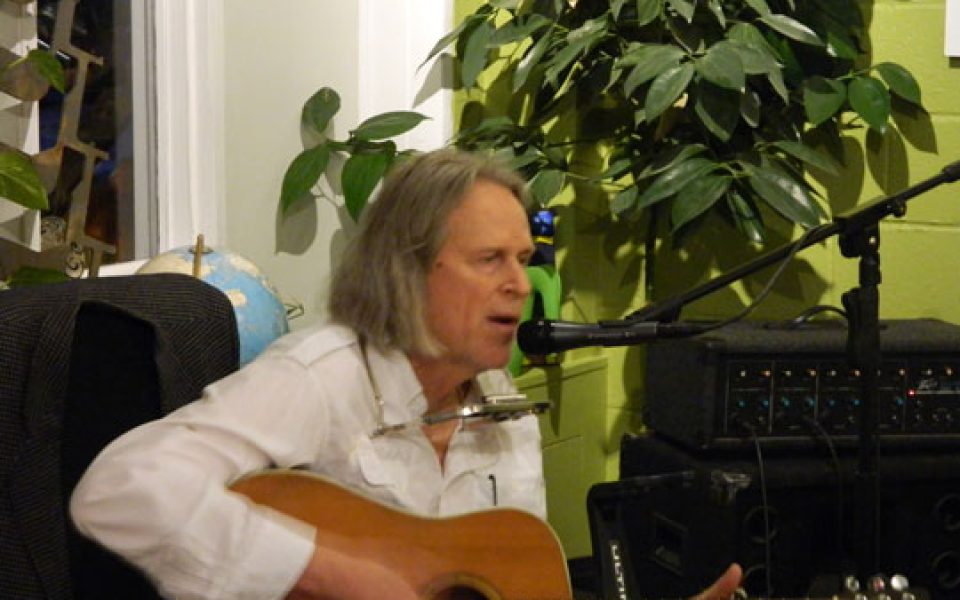Laura Dodd, wife and manager of the folk singer Bruce Piephoff, sat in a booth at Common Grounds coffeehouse on Friday as her husband played his second set during a launch party for his new CD, Soft Soap Purrings.
When Piephoff hinted he might be nearing the end of the set, Dodd, a restaurant server by trade, badgered him to play a few more.
“More coleslaw for that table,” Piephoff shot back.
Then he paused to assess the situation.
“I’ve gotten so used to playing these with other people, it’s kind of freaking me out,” he said. “When I get to a break I’m expecting a saxophone solo or Scott Sawyer on guitar. Oh well, it’s probably good for me.”
For his March 21 album release party at the Sharp Nine Gallery in Durham, Piephoff had been joined by many of the musicians who performed on the new record. Now, for the launch party in his hometown of Greensboro at Common Grounds coffeehouse, just around the corner from his place in Lindley Park, Piephoff was armed only with an acoustic guitar and his voice, a dusty instrument with occasional glints of loveliness.
Tall and built like a basketball player (Grimsley High School, ca. mid-’60s), wearing a white shirt and long brown hair that has taken on ample swatches of gray, Piephoff bears a slight resemblance to Neil Young. Likewise, he comes across as pissed off and cantankerous as opposed to more mellow with seasoned age.
Seated with a guitar in hand he spun out a set of new songs, and then another that featured selections from his vast repertoire.
His solo appearance in Greensboro seemed somewhat counterintuitive considering that his work has increasingly relied on collaboration and accompaniment, and Soft Soap Purring, his 22nd album, is his most produced yet.
Not that Piephoff is any stranger to the self-sufficient folksinger mode; his catalogue is stuffed full of more than a few tunes that owe a debt to the phrasing of Bob Dylan and Townes Van Zandt, even as his lyrical content has accumulated the lore of his Piedmont locale. Likewise, the poetry folded into Piephoff’s oeuvre is also a solitary and self-sufficient endeavor.
Soft Soap Purrings was recorded at Mitch Easter’s Fidelitorium in Kernersville, and Piephoff regards it as his personal best. Produced by longtime collaborator Scott Sawyer, many of the dozen tracks on Soft Soap Purrings also feature Sawyer’s atmospheric electric guitar in a collection that overall tends toward the jazzier side of Piephoff’s output. Fiddle performances by Pattie Hopkins and dobro by Aaron Ballance keep faith with the downbeat mood, while backup vocals by Claire Holley, among others, gracefully round out the rough edges of Piephoff’s voice.
Overall, it’s a downbeat excursion by an artist who seems at creative loose ends, not quite hitting his stride or breaking new ground. Neither finely wrought lyrics nor tasteful instrumental pairings can disguise a dispassionate cast in Piephoff’s vocal delivery.
The songs on Soft Soap Purrings resist the immediate gratification rendered from classics from the Piephoff catalogue such as the elegantly direct “I Want to Be a Tree” from 1999’s Deep River Anthology or the lovely “Notes from Knoxville” from 2008’s The Chestnut Tree, although several, including the lead track, leave an indelible impression.
“I hear soft soap purrings from voices quivering with hate/ I see ‘KKK’ tattooed on the fingers of a young boy/ I see horsefaced evangelists speaking with aplomb,” Piephoff sings in the dyspeptic title track, which essentially refers to a false bill of goods. Sawyer’s pensive accompaniment on electric guitar sets the tone for the rest of the album.
“Riding the Stream,” released earlier on 2002’s Slaughterhouse and 2005’s Bright Leaf Blues, is drafted back into service for Soft Soap Purrings. Whereas earlier acoustic versions of the song evoked the affecting directness of Woody Guthrie’s “Deportee (Plane Wreck at Los Gatos),” the refined jazz treatment on the recent recording seems to drain the song of its feeling.
“Open the Window,” the fifth track, finally finds Piephoff’s voice matching with the weight of his lyrics with what sounds like conviction. Couplets like “Open the window to volcanic hearts/ Open the window when the crying starts” pack a punch.
“Dakota” likewise hits the mark. The only spoken-word track on the album, it clocks in at 2½ minutes with a striking bit of meditative guitar. The tribute to Dakota Joe, which contains a glancing reference to the musician Billy Ransom Hobbs — killed in a 2008 house fire — qualifies as literature: “You’re probably out there somewhere fishing and picking a 12-string guitar on the banks of some rolling river near a railroad track with Billy Ransom cooking mulligan stew on a campfire and rolling smokes and sipping Irish whiskey. I hope to get to see you guys again when I go there; I’m just not quite ready yet.”
At Common Grounds, 25 or so people listened attentively, applauding between songs. A young man played chess with the barista as his female companion sat at the end of the bar watching Piephoff appreciatively.
After the concert, Piephoff greeted fans and sold CDs.
Rather ruefully and with a hint of envy, he mentioned his friend, the folksinger David Childers, who is based in the Charlotte area.
“He’s built up a real good audience down there,” Piephoff said. “That’s what it takes.”
“I did all right,” he added, gesturing towards a plastic tip jar. “I made some money tonight.”
Join the First Amendment Society, a membership that goes directly to funding TCB‘s newsroom.
We believe that reporting can save the world.
The TCB First Amendment Society recognizes the vital role of a free, unfettered press with a bundling of local experiences designed to build community, and unique engagements with our newsroom that will help you understand, and shape, local journalism’s critical role in uplifting the people in our cities.
All revenue goes directly into the newsroom as reporters’ salaries and freelance commissions.


Leave a Reply